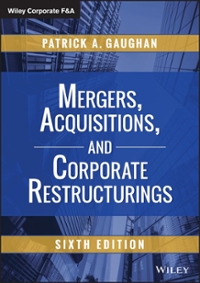Question
SHR Corporation is a midsize, publicly traded direct marketer and retailer of outdoor sporting goods based in the United States. Its common stock is listed
SHR Corporation is a midsize, publicly traded direct marketer and retailer of outdoor sporting goods based in the United States. Its common stock is listed on the New York Stock Exchange under the symbol "SHR." The company prides itself on selling high-quality outdoor sporting goods at competitive prices and providing outstanding customer service. SHR directly markets its merchandise through two major channelsits catalogs and its websiteto customers in the United States and nearly 100 other countries. It currently has retail stores and distribution centers in the United States, Canada, and Europe. A salesforce is responsible for dealing with buyers at both the wholesale and retail levels. SHR Corporation recently purchased MVF Company, a manufacturer of high-quality outdoor sportswear. The manufacturing process involves the use of technology-based machinery to cut cloth into various sizes, sew the cloth to conform with the size requirements of the sportswear, and use a series of dies and chemicals to ensure the colors meet consumer expectations. SHR also purchases merchandise from highly reputable vendors in the United States and several other countries. SHR Corporation has enjoyed several consecutive years of sustained growth as reflected in the selected financial information, expressed in millions of dollars, presented below: 2017 2016 2015 Total Assets $700.5 $546.5 $491.3 Sales Revenue 763.5 665.7 589.8 Operating Income 57.5 45.0 38.9 Net Income 34.3 29.0 26.0 Senior management is continuing its efforts to grow the company, increase its market share, and enhance shareholder value by: further expanding its direct sales globally. systematically increasing the number of retail stores. selectively acquiring other businesses that are aligned with its core competencies. Increasing competition over the past several years has motivated management to continuously pursue new and innovative ways to differentiate SHR's products, streamline the company's business processes, and take full advantage of advances in IT. Operating efficiency is a critical component of SHR's competitive pricing strategy. The risks that concern senior management the most heading into fiscal 2018 include the following: The continuing economic uncertainty may further decrease discretionary consumer spending, which in turn will adversely affect the company's sales and profitability. Mounting competition in the industry may make it increasingly difficult to differentiate the company's high-quality merchandise at prices consumers are willing to pay. Deterioration of the company's brand or its positive image in the marketplace may adversely affect sales and profitability. Failure to successfully integrate newly acquired businesses may adversely affect the company's performance. The inability to generate operating efficiencies and leverage IT may adversely affect the company's profits. Placing too much emphasis on operating efficiencies may adversely affect product quality and customer service. During the first six months of 2018, SHR has experienced slower sales growth and higher operating expenses than anticipated. There is growing concern that forecasted performance targets for the year will not be achieved. Test of Compliance with SHR's Gift Exchange Policy Given the growth in SHR's salesforce around the world, as well as management pressures to continue sales growth during more difficult economic times, the internal audit function decided to include an audit of the company's gift exchange policy in the annual internal audit plan. The objective of this audit is to evaluate compliance with the policy and recommend improvements that may help to ensure ongoing compliance in the future.
SHR's Gift Exchange Policy is summarized below:
Creating and maintaining good relationships with our customers, suppliers, and business partners are important to SHR's success. The occasional exchange of gifts, meals, and entertainment of small value are a common business practice meant to provide a legitimate opportunity to interact, create goodwill, and establish trust. However, it is important to use good business judgment when determining the appropriateness of gifts, meals, or entertainment. Business gifts that are extravagant or would influence behavior are inappropriate and should not be given or accepted. An inappropriate gift might cloud objectivity and decision-making. The exchange of gifts given with the intent to bribe, make a kickback, or place undue influence are illegal and not the way SHR conducts business. An appropriate business-related gift is: Of moderate value, whether given or received. Something that will not embarrass or discredit the company. Not made in cash or cash equivalent such as checks, money orders, stock, and similar items. Gifts, meals, or entertainment that you receive that have an actual or estimated value of over US $500 must be reported to the CCO.
Required
1. Based on your review of the policy above, what would you consider the strong points of the policy and what, if any, shortcomings did you notice? 2. Develop key steps to test compliance with the Gift Exchange Policy. Specifically, outline key procedures that might be performed to test the design adequacy and operating effectiveness of controls related to this policy.
Step by Step Solution
There are 3 Steps involved in it
Step: 1

Get Instant Access to Expert-Tailored Solutions
See step-by-step solutions with expert insights and AI powered tools for academic success
Step: 2

Step: 3

Ace Your Homework with AI
Get the answers you need in no time with our AI-driven, step-by-step assistance
Get Started


